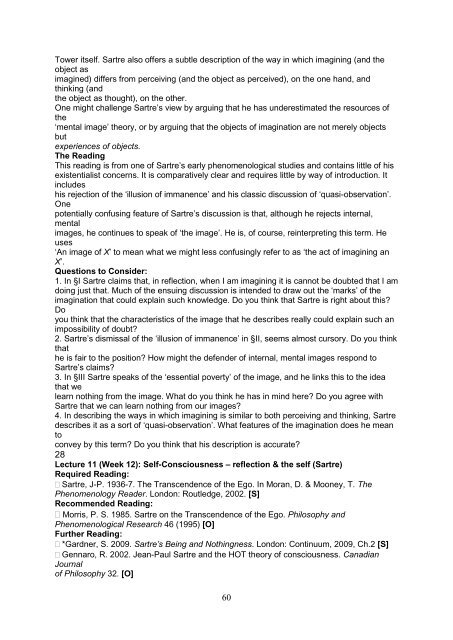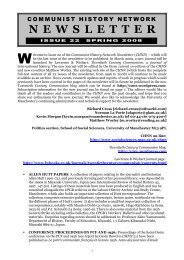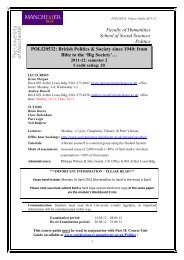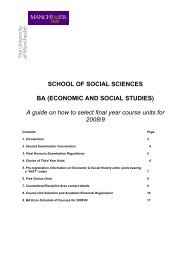second year course outlines 2012-2013 - School of Social Sciences ...
second year course outlines 2012-2013 - School of Social Sciences ...
second year course outlines 2012-2013 - School of Social Sciences ...
You also want an ePaper? Increase the reach of your titles
YUMPU automatically turns print PDFs into web optimized ePapers that Google loves.
Tower itself. Sartre also <strong>of</strong>fers a subtle description <strong>of</strong> the way in which imagining (and the<br />
object as<br />
imagined) differs from perceiving (and the object as perceived), on the one hand, and<br />
thinking (and<br />
the object as thought), on the other.<br />
One might challenge Sartre’s view by arguing that he has underestimated the resources <strong>of</strong><br />
the<br />
‘mental image’ theory, or by arguing that the objects <strong>of</strong> imagination are not merely objects<br />
but<br />
experiences <strong>of</strong> objects.<br />
The Reading<br />
This reading is from one <strong>of</strong> Sartre’s early phenomenological studies and contains little <strong>of</strong> his<br />
existentialist concerns. It is comparatively clear and requires little by way <strong>of</strong> introduction. It<br />
includes<br />
his rejection <strong>of</strong> the ‘illusion <strong>of</strong> immanence’ and his classic discussion <strong>of</strong> ‘quasi-observation’.<br />
One<br />
potentially confusing feature <strong>of</strong> Sartre’s discussion is that, although he rejects internal,<br />
mental<br />
images, he continues to speak <strong>of</strong> ‘the image’. He is, <strong>of</strong> <strong>course</strong>, reinterpreting this term. He<br />
uses<br />
‘An image <strong>of</strong> X’ to mean what we might less confusingly refer to as ‘the act <strong>of</strong> imagining an<br />
X’.<br />
Questions to Consider:<br />
1. In §I Sartre claims that, in reflection, when I am imagining it is cannot be doubted that I am<br />
doing just that. Much <strong>of</strong> the ensuing discussion is intended to draw out the ‘marks’ <strong>of</strong> the<br />
imagination that could explain such knowledge. Do you think that Sartre is right about this?<br />
Do<br />
you think that the characteristics <strong>of</strong> the image that he describes really could explain such an<br />
impossibility <strong>of</strong> doubt?<br />
2. Sartre’s dismissal <strong>of</strong> the ‘illusion <strong>of</strong> immanence’ in §II, seems almost cursory. Do you think<br />
that<br />
he is fair to the position? How might the defender <strong>of</strong> internal, mental images respond to<br />
Sartre’s claims?<br />
3. In §III Sartre speaks <strong>of</strong> the ‘essential poverty’ <strong>of</strong> the image, and he links this to the idea<br />
that we<br />
learn nothing from the image. What do you think he has in mind here? Do you agree with<br />
Sartre that we can learn nothing from our images?<br />
4. In describing the ways in which imagining is similar to both perceiving and thinking, Sartre<br />
describes it as a sort <strong>of</strong> ‘quasi-observation’. What features <strong>of</strong> the imagination does he mean<br />
to<br />
convey by this term? Do you think that his description is accurate?<br />
28<br />
Lecture 11 (Week 12): Self-Consciousness – reflection & the self (Sartre)<br />
Required Reading:<br />
Sartre, J-P. 1936-7. The Transcendence <strong>of</strong> the Ego. In Moran, D. & Mooney, T. The<br />
Phenomenology Reader. London: Routledge, 2002. [S]<br />
Recommended Reading:<br />
Morris, P. S. 1985. Sartre on the Transcendence <strong>of</strong> the Ego. Philosophy and<br />
Phenomenological Research 46 (1995) [O]<br />
Further Reading:<br />
*Gardner, S. 2009. Sartre’s Being and Nothingness. London: Continuum, 2009, Ch.2 [S]<br />
Gennaro, R. 2002. Jean-Paul Sartre and the HOT theory <strong>of</strong> consciousness. Canadian<br />
Journal<br />
<strong>of</strong> Philosophy 32. [O]<br />
60

















